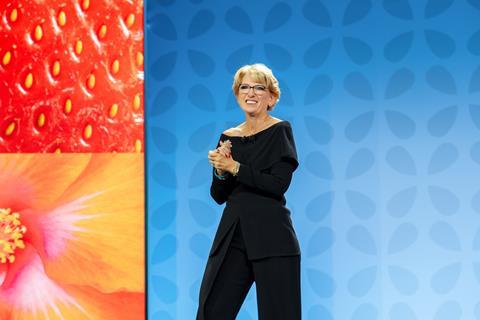IFPA CEO Cathy Burns issues clarion call and outlines organisation’s key advocacy role

The global fresh produce industry has a huge opportunity to lead the health agenda by putting fruit and vegetables at the heart of modern diets.
That was the message from International Fresh Produce Association (IFPA) chief executive Cathy Burns, who opened the Global Produce & Floral Show in Anaheim, California this week by outlining the threats and opportunities facing the trade in 2025.
In a wide-ranging speech, Burns touched on emerging threats to the industry, geopolitical risks, the challenges of climate change and the importance of sustainability. She also underlined IFPA’s extensive advocacy work, the role of technology in improving industry efficiency, and the potential of artificial intelligence.
Food as medicine
The consumer opportunity was central to Burns’ message, and in particular fresh produce’s role in helping fight the well-documented health challenges faced by US and other western consumers.
In the US, IFPA has urged the Food & Drug Administration to recognise produce prescriptions as a supplemental benefit and approve it for Medicare. Fresh produce should form a key part of standard medical care, it believes.
Expanding on the point, Burns said that nutrition and health is at the centre of so many conversations right now, and the industry should seize the moment to stress its benefits at a time when other food suppliers are “falling over themselves to put their products in a positive light by complying with rules and mandates”.
“The best part about fruit and vegetables is you don’t have to do a thing – we don’t require reformulations, reductions or rebrands,” she said. “Our products are real and wholesome, and we will not stop until produce is represented in programmes focused on diet-related diseases around the world.”
To guide its global work in this area, IFPA has appointed a chief medical officer to its foundation in the past year, as well as launching a Fresh Produce for a Healthier America campaign that put fruit and veg front and centre with the Make America Healthy Again (MAHA) commission.
“We’re taking the spirit of this effort globally so that policymakers around the world recognise how integral our products – fresh fruits and vegetables – are to global health, and they act on it,” Burns revealed. “This campaign is laser focused on positioning our products as the solution.”
Burns spoke of three key areas central to boosting consumption – leveraging public-private partnerships; early intervention and child nutrition; and Food Is Medicine, an approach that sees medicinally tailored diets for chronic disease prevention and management in the US.
Tariff tension
In its short history as an organisation, IFPA has evolved to increase its advocacy efforts and investments to address industry threats, Burns said. A large number of elections around the world had brought change and upheaval, making it all the more important to have a global body standing up for the industry, she stressed.
Discussing the impact of US president Donald Trump’s tariffs, Burns said IFPA believes in “science-based trade policies and transparent rules-based trading systems”, and has therefore advocated for exemptions for all fresh produce and floral products. “We really encouraged the US administration and trade partners to create deals to remove country-specific tariffs, and we expanded support, connections and market intelligence in other priority markets,” she said.
Backing up the approach, IFPA members provided data on tariff impacts, while the organisation’s board of directors met with the US Trade Representative’s office and National Economic Council to provide the industry perspective and advocate for exemptions.
The role of technology
A fan of technology, Burns highlighted numerous ways in which scientific advances could help the industry achieve its goals. One such innovation in the trade sector was the creation of Stanford’s AI-driven Geoeconomic Monitor, she said, which is being used to analyse tariff impacts.
Indeed, artificial intelligence was regularly highlighted in Burns’ speech. To help IFPA members access and act on the data contained in the organisation’s industry and consumer research, IFPA has launched an AI-powered Global Intelligence Engine to provide industry-specific insights from extensive data, aiming to enhance decision-making and financial outcomes.
“I’m excited to announce that today we are launching an incredible tool to help you uncover insights from our deep database of proprietary industries and consumer research,” she explained. “This has been in development for about the last eight or nine months. I’m so excited that this is going to give you a trusted AI engine at your fingertips that is built just for you.”
The development comes as AI continues to make inroads in agricultural sustainability, from automating soil analyses to the use of digital twins that duplicate and predict real-world conditions, Burns noted.
Other big topics in Burns’ address centred on sustainability and access to labour. Sustainability remains a top priority for IFPA, with the organisation engaging with bodies from the US Congress to the UN’s Environment Programme and COP.
And on labour, Burns highlighted IFPA’s legal victories and collaborations with government agencies, which have relieved some pressures on growers, including changes in wage rates and enforcement clarity.
Burns concluded her speech with a call for IFPA members and the industry to further unite in the fight for fresh. “I began this State of the Industry by talking about what IFPA believes as an organisation, so let me close by talking about what I believe as a person.
“I believe we can’t build a vibrant future for all unless we build a vibrant future for you. I believe we must judge our advocacy by our results, not just our actions. I believe we can achieve so much together. Because of that, I believe our future is incredibly bright and we’re just getting started,” she said.



